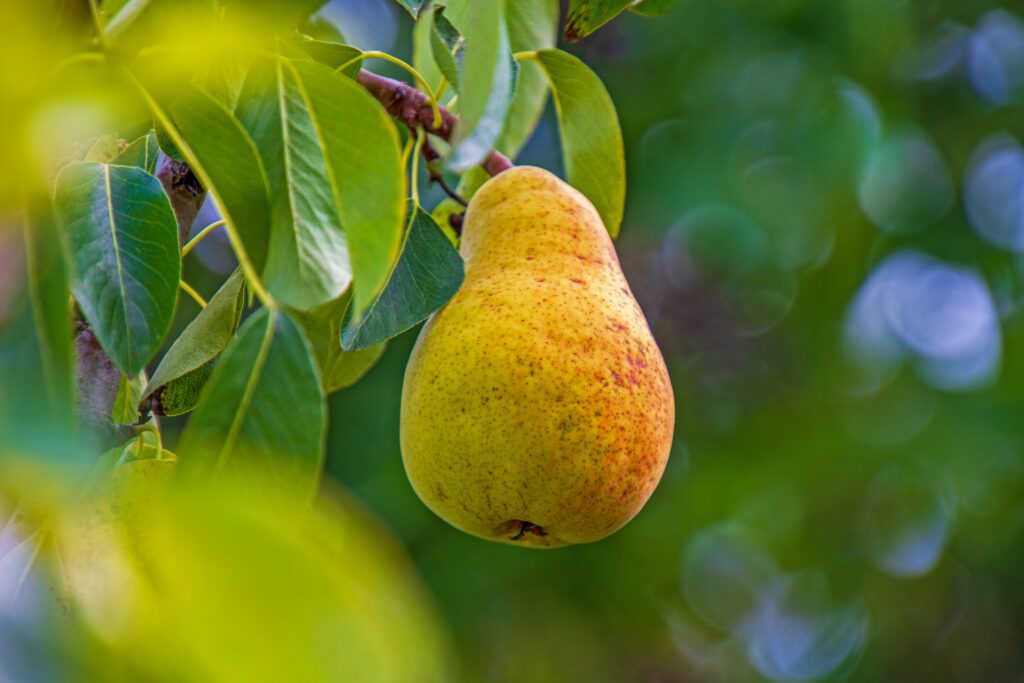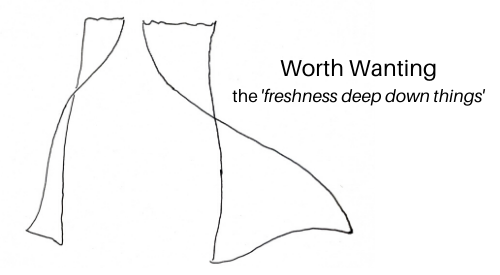
Fresh refers to things recently made or acquired, things not yet used, and more generally, to things (including situations) experienced as pleasantly new or different. Fresh fruit. Fresh bread. Fresh clothes. Fresh air. A fresh sheet of writing paper. A fresh start.
Freshness is the quality such things have, as opposed to being stale, tired, worn. It’s a quality of promise and fulfillment combined, of whetted appetites and available affordances.
What are affordances? They refer to what’s on offer in the world one is situated in, or putting it another way, opportunities for action in an environment. So to a bird, for instance, available perching places, nesting sites, sources of food, the air itself, as well as other birds, and lurking cats, represent what its environment affords it, for good or ill.
We can think of reality as, at least, the coalescence of the arrays of affordances provided to each of us as situated beings, not all of pertinent or available all the time to any of us, but certainly some sometimes.
Think of the fragrance of a ripe pear: an apertif sign that the fruit furnished by the tree (or grocer) is ready to reward the one who bites with sweet juice and tasty flavors already hinted at by the fragrance.
Think of a morning when waking with renewed energy into a day full of promising hours.
Think of spring, the archetypical time of freshness, when buds, dormant all winter, revive and open into flowers and leaves, and birds, away all winter in other places, return to build nests and sing to one another. Young and tender things everywhere and months of warm outdoor days ahead: ah, spring. (I speak as a New Englander.)
Mundane appetite may be aroused by an aroma. The associated affordance may be a cooked meal on the table waiting to be enjoyed, but the pleasure of that meal whets our appetite for other gustatory treats, all that are, can be and may come. Likewise the book jacket arouses our interest in the affordance, the book itself, which the delight of reading prompts us to look for more by the same author, or in the same genre, or with the same impact on us, or whatever impact it does have.
Likewise, the whatever it is that prompts us to initiate encounters with others, or to accept invitations to engage finds its affordance in the encounter itself, the actual time, place and number-constrained occasion that unfolds as it does. But the discoveries we learn from, the experiences we are affected by, the connections that make meaning for us inspire us to dream of encounters, on and on, unconstrained by transience, by the past, by even death.
This dynamic–the appetite, the affordance, and the further appetite aroused by the affordance for yet more, yet further–is the experience of freshness: something good in itself but with also a suggestion of other good things around and a hint of other good things to come, some of them definite and foreseeable, but some of them undefined and not yet suspected. A sense of open-out-edness, open-endedness, and on-goingness is essential to freshness’ glamour.
Natural freshness, freshness in the mundane realm, is focussed on things and signs, objects, that exist in situations with specific constraints: space (including impenetrability), time (including history), and number (including measurability). And the mundane world, both what is natural and what is social, affords us an immense and dynamic array of things inviting us to explore and exploit.
Natural evolution is an example of emergent possibilities based on the affordances of the physical world, what is given and what is latent within the given as guided by the constraints of physical law. These occasions of emergence are the opportunities for new branches to radiate and new potentialities to form–not all possible possibilities but some, and they new. The poignancy of natural freshness is its transience; its frustration, the accumulating burden of the past; and its fear, mortality.
Natural appetite is experienced in conjunction with basic motives of survival, comfort and dignity, and their enabling agendas, as a desire supplementing that which comes from natural need.
Whereas natural freshness is the experience of the promise of natural appetite vis-a-vis natural affordances, transcendent freshness pertains to transcendent appetite and transcendent affordances. What’s the difference?
Transcendent appetite, focussed on others and othernesses met in encounters, is the appetite for appetite itself. It’s an ongoing open-ended attitude of desirous expectancy, not just for what is, can be and may come in the world of physical things, but for occasions of encounter. It is the appetite for contact with, commitment to and communion with particular others, with other others, with the world of all others, and with transcendent freshness itself, Other yet lover.
Mundane appetite aims at coming to a definite conclusion; transcendent appetite aims at never concluding. Mundane affordances are things, signs and situations; transcendent affordances are others, othernesses and encounters.
The only evidence we have of the transcendent is the appetite that prompts us to initiate or accept invitations to encounter. Not all ever feel that appetite. Not all who do feel it, do so always. But this appetite is persistent and prevalent enough to warrant the question: what could be the reality the affordances of this appetite is oriented toward? And might they be true affordances, referring to an world actually there, or false?
I think transcendent freshness is more like personal character than impersonal quality, and more like an agent than an agency.
What might be this ‘freshness deep down things’ be like? It doesn’t have a face other than that of an other, and it doesn’t have exploits other than those of encounters, so how to think of it as an agent?
First of all, it’s transcendent, meaning, on one hand, unconstrained by time, space or number, but on the other constrained, that is guided, by considerations of hospitality, friendship and exploration.
Second, while we yet live in the mundane realm, freshness is experienced as what invites us to occasions of encounter, facilitates them, and with us, reflects on them, and so doing, whetting our appetite for what the transcendent affords. After we live, it is experienced as the magister ludi forever of all encounters it participated in with us, and all other encounters that ever were or will be. Throughout, as the champion of encountering, freshness is experienced as the lover of our livingness particularly, of all livingnesses, of the livingness of the mortal world, and of its own.
Third, freshness is incessantly active in three areas: first, generating potentialities from raw possibilities (setting initial conditions and constraints, and giving some kind of kick); second, prompting and participating in all encounters and incorporating its experience of all encounters into itself, into its self-development; and third, exploring continually and progressively toward the consummation of creation, which is, at least, a new and lively transcendent cosmos of encounters encountering encounters, on and on and on.
The ‘freshness deep down things’ where depth opens up to breadth is what quickens in us when a new horizon calls us, when some object or other impresses or intrigues or intimately touches us, when some emerging or arriving thing, new or unforeseen, challenges us.
Transcendent freshness is perhaps an unfamiliar concept, but it is not, I maintain, an unfamiliar experience.
Here’s my prayer:
Freshness, oh, you:
Present whenever I, or any,
Are open to your energy, your potentiality, your power;
You, who made making, introduced doing, started saying,
Let the consummation of your creation
Swiftly come, soon arrive,
That new and lively cosmos of unbounded friendship, hospitality and exploration,
Of change without transience, time without the past, life without death,
Your dwelling in the midst.
Give us what we need to live today, and
Forgive us when we do what doesn’t honor you,
As we forgive those who dismiss, despise and disappoint us, and
Send timely help when we’re tempted or attacked.
For you generously invite us to share your eternal livingness;
Who you are, what you do,
How impressive, how intriguing, how intimately touching,
Each day, every day, forever.
